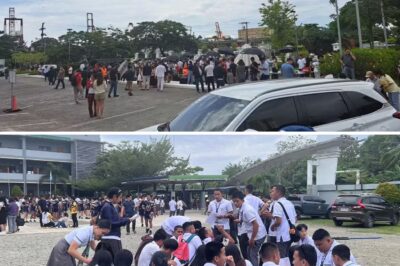
In the Philippines, the entertainment industry and political arena often intersect, creating a unique breed of public figures who command both adoration and scrutiny. Roderick Paulate, a household name beloved for his comedic genius and admired for his stint as a Quezon City councilor, embodied this intersection. For decades, he was a fixture on television screens, bringing laughter and joy to millions. Yet, behind the public persona and the political ambitions, a darker narrative was unfolding, one that would lead to a sensational trial, a damning conviction, and a sentence that has shocked the nation: 62 years in prison for graft and falsification.
The roots of Paulate’s legal troubles trace back to his tenure as a councilor in Quezon City in 2010. It was during this period that the Commission on Audit (COA), the supreme audit institution of the Philippines, launched an investigation into alleged financial irregularities within his office. The findings of the COA report were nothing short of explosive, pointing to a sophisticated scheme involving “ghost employees.” These were supposedly fictional individuals listed on the council’s payroll who, in reality, performed no work but whose salaries were nonetheless disbursed. The report revealed that more than PHP 1.1 million (approximately $18,700 USD) was paid out in salaries to these non-existent workers, a significant sum that raised immediate red flags about the integrity of public funds.
The allegations transformed Paulate’s public image from a cheerful comedian to a central figure in a high-profile corruption case. The subsequent years were marked by intense legal proceedings, rigorous investigations, and the slow grind of the judicial system. For many, it was a test of whether justice would truly be served, regardless of a person’s celebrity status or political connections.

Finally, in December 2022, after more than a decade since the initial investigation, the Sandiganbayan’s 7th division, the special court that handles graft and corruption cases in the Philippines, delivered its verdict. Roderick Paulate was found guilty on one count of graft and nine counts of falsification of public documents. The conviction came with a devastating sentence: a cumulative total of 62 years in prison. This included a sentence ranging from six to ten years for the graft charge, and six years for each of the nine counts of falsification. In addition to the lengthy prison term, Paulate was ordered to pay a fine of PHP 1 million (approximately $17,000 USD) as restitution to the government.
The judgment sent shockwaves across the country, particularly within the entertainment and political circles. For many who had grown up watching Paulate, the news was difficult to reconcile with the jovial image they held of him. It was a stark reminder that the long arm of the law can reach even the most celebrated figures.
Undeterred, Paulate, through his legal team, immediately pursued all available remedies. In January 2023, he filed a motion for reconsideration, seeking to overturn the Sandiganbayan’s decision. However, this appeal was swiftly denied by the court, upholding the initial conviction. This rejection meant that the original sentence remained intact, bringing Paulate closer to the grim reality of decades behind bars.
Despite the gravity of the Sandiganbayan’s ruling and the denial of his motion for reconsideration, Paulate has remained a free man, at least for the time being. This is because he has exercised his right to appeal to a higher court, specifically the Court of Appeals. The legal process in such high-stakes cases can be protracted, allowing defendants to remain out of custody while their appeals are being heard.
In various interviews following his conviction, Paulate has consistently maintained his innocence. “I am not jailed,” he adamantly stated, a declaration that underscores his ongoing legal battle and his belief in ultimate vindication. He has expressed profound pain and disbelief that, as someone who dedicated years to public service and was cherished by the people, he finds himself embroiled in such a scandal. “The people trusted me, that’s why I leave everything to God. I know my intentions are pure,” he asserted, painting himself as a victim of circumstances or perhaps a flawed system, rather than a perpetrator.
The public reaction to Paulate’s case has been polarized. His loyal supporters have rallied behind him, expressing understanding and unwavering belief in his character. Social media was abuzz with comments from fans who vouched for his integrity, with many affectionately referring to him as “Kuya Dick” (Brother Dick) and insisting that he is a good person incapable of such anomalies. This outpouring of emotional support highlights the deep personal connection many Filipinos feel towards their celebrities, often extending belief even in the face of legal judgments.

Conversely, a significant segment of the public and various advocacy groups have been critical, emphasizing that anyone who violates the law, regardless of their status as an artist or politician, must be held accountable. For them, Paulate’s case serves as a crucial testament to the principle that justice is, or at least should be, blind. It underscores the importance of upholding the rule of law and ensuring that those entrusted with public office are held to the highest standards of integrity.
Amidst the legal battles and public scrutiny, Paulate has attempted to maintain a sense of normalcy and positivity. He has continued to be active in the entertainment industry, taking on roles and making public appearances, perhaps using his work as an anchor during these turbulent times. In interviews, he has stated his commitment to focusing on the positive aspects of his life and drawing strength from those who continue to believe in him.
As of now, the Court of Appeals has yet to render a final decision on his appeal, meaning the legal saga continues. The outcome of this case holds significant implications, not only for Roderick Paulate personally but also for the broader discourse on accountability in Philippine politics and public service. While he awaits the appellate court’s ruling, Paulate continues to live his life, carrying the hope that he will ultimately be given the chance to clear his name and restore his reputation. His case remains a powerful, poignant reminder that even the most celebrated figures in society can find themselves tested by the law, and that the pursuit of justice is often a long, arduous journey marked by both conviction and unwavering hope.
News
Isang Lihim na Pag-ibig, Isang Malupit na Pagtataksil: Ang Call Center Agent na Pinatay Dahil sa Pagtangging Maging Kerida
Sa likod ng masayang boses ng isang dedikadong call center agent ay isang dalagang may pusong puno ng mga pangarap….
A Secret Love, A Brutal Betrayal: The Call Center Agent Murdered for Refusing to Be a Mistress
Behind the cheerful voice of a dedicated call center agent was a young woman with a heart full of dreams….
Former Philippine President Rodrigo Duterte’s Desperate Bid for Freedom Crushed as ICC Rejects Interim Release, Deepening Political Storm and Leaving Supporters in Disbelief
In the annals of global political figures, few have commanded the fervent loyalty and intense controversy that Rodrigo Duterte, the…
Billions Vanish in Plain Sight: Explosive Report Uncovers Alleged $10.3 Billion Road Scam Rocking the Philippines, Implicating High-Ranking Officials and Sparking Outrage Over ‘Ghost Projects’
In the annals of national governance, few allegations strike with the visceral impact of corruption, particularly when it involves the…
2 d**d as magnitude 7.4 quake rattles Mindanao, Visayas
MANILA, Philippines — At least two people were killed after a powerful magnitude-7.4 earthquake struck off Davao Oriental on…
The Voice That Brought a Diva to Tears: Rouelle Carinho’s Shocking Matt Monroe Impersonation Stuns Dulce on Eat Bulaga!, Igniting a National Obsession with His Unforgettable Talent
In the vibrant, often boisterous world of Philippine television, moments of raw, unbridled emotion can cut through the noise, capturing…
End of content
No more pages to load












